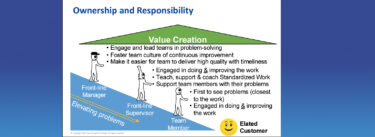I’m not talking about the ancient, robust species. No, I’m talking about the challenges of Toyota Way transformation that go all the way back to the concept of resilient, organic growth.
In bizspeak, “organic growth” means growing by finding ways to reliably create new value, something that goes beyond reducing price or acquiring another firm and adding its revenue to yours. Usually this means entering new markets or bringing valuable novelty to familiar ones, both of which can entail serious risk if you don’t have the right stuff (consider the Edsel, the Newton, Google Glass, etc.).
We contrast organic growth with a relatively new growth strategy based on acquiring aging mass production firms and “cLeaning up” production… reducing inventory/smoothing flow – a non-trivial undertaking to be sure – thereby dropping nice size bundles of cash directly to the bottom line. This healthy new cash flow then funds the next cLean up target acquisition. And so on and so on. It’s a lovely virtuous circle, especially when capital is inexpensive.
Understanding Shark Behavior
Over the past 25 years a small number of firms have grown spectacularly in revenue, employees, and stock price by using this cLean up strategy and executing crisply on tactics. “Spectacular” as in the 200x revenue growth, 65x employee growth, and 20x stock price growth kind of spectacular. Think of them as lean sharks: always moving and always feeding, finding fat manufacturing firms and reliably leaning them out with parachuted SWAT squads.
With a shark strategy some Toyota Way thinking does leak out from the shop floor, but it’s mighty tempting to stay focused on finding the next “quick win” acquisition rather than on the hard, time-consuming work needed to truly transform managerial and design knowledge workers’ thought-worlds and behavior in other parts of the enterprise. Transformation of non-production parts of an enterprise is hard and time-consuming because it’s hugely tangled and complex. Corporate strategy, customers’ voices, competitors’ moves, technology development, finance, supply network development, product development – all of these things affect each other and affect the whole. Further, WIP here is mostly a fluffy cloud of ideas instead of widgets you can touch and count, so “managing to see problems” is an idea that gets complicated fast.
Still, what’s not to like? Wouldn’t lean shark growth make any CEO handsomely compensated and board of directors proud? Well, no. Sooner or later opportunity to buy up and lean-out old firms dwindles. Either you buy them all up or you get competitors with the same strategy or both. In fact, it looks like this has started to happen to the more successful of these lean shark firms, in part because when you’re already a Great White, the bigger the acquisition you need to find and transform in order to move the percent-growth needle and keep stock market analysts happy.
Understanding Tortoise Behavior
And then there are lean tortoises: bullet-proof firms like Toyota and its supply network. They are archetypal practitioners of “go slow to go fast.” When these firms acquire and transform they clean up production AND clean up leadership. For them it starts with careful selection of target firms that can build out into a network of supply capability that’s geographically well-situated. Then follows a decade or so of on-site nurturing of management that begins with the initial clean up, where key senior home-firm players spend long hours day in and day out grasping problems and coaching local execs to learn how to see and solve problems and to coach others.
In terms of expert effort and time per firm, this requires probably an order of magnitude greater than any lean shark expends. To recap, we’re talking about a “deep knowledge” Toyota Way acquiring firm, senior coaches, patient and persistent daily attention, a longer time horizon, and belonging to a group of like-minded, learning local firms like BAMA, Toyota’s supplier network in the southeastern U.S. These firms stand and grow on their own within an ecosystem of similar firms.
The Challenge for Sharks (or for the Rest of Us?)
30 years or so of lean transformation efforts have shown us there’s pretty much nothing harder to change than default, automatic “thinking” and doing based on a reflection-free mental model and associated habits. For lean shark execs and design knowledge workers, we’re talking about default thinking like the following:
- Conventional managerial accounting and budgeting
- Management by objectives (MBO): “I empower you to do this FOR me, and if you can’t, I’ll empower someone else who can!”
- Stock market hypersensitivity
- Discipline-locked engineering and supplier development, etc.
All of these things can keep execs nearly blind to long term benefits of transforming their side of things. It hardly seems even worth a glance, a neatly comfortable and stagnant trap.
But without whole-enterprise transformation, gains in manufacturing start to plateau because the only value lever we can pull is manufacturing cost reduction. We’re not generating all that much novel value with new products. When cost reduction benefits start to taper off, causing profitability to sag and unfavorable stock market analyst attention to rise, we’re spurred to yet more acquisition-seeking and we go skim some fresh cream. The Shark’s virtuous circle begins to turn a little sour.
So, what do you think? What will happen to the lean sharks? Is transforming from shark to tortoise a good idea? Can lean sharks even become tortoises? What would that take? In what ways does organic transformation depend on the approach that Tortoises have taken? What are the problems with that kind of transformation?
Along these lines, some exciting ways to tackle transformation of managerial and design knowledge work are beginning to surface. Mike Rother’s (and Jeff Liker’s and many others’) kata work goes right to the heart of what it takes to change behavior and thinking in a programmatic way that applies to anyone, executives included. LEI’s new focus on supporting a growing LPPD community of practice can help show just how energizing it is for everyone in the organization to share focus on creating and delivering cool, useful, sustainable products for customers. What other work in these areas do you see happening?





